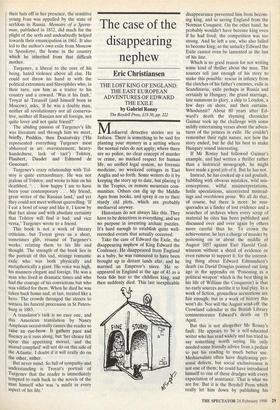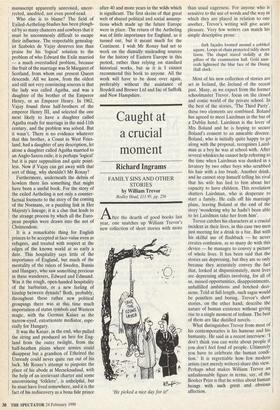The case of the disappearing nephew
Eric Christiansen
THE LOST KING OF ENGLAND: THE EAST EUROPEAN ADVENTURES OF EDWARD THE EXILE by Gabriel Ronny The Boydell Press, £19.50, pp. 222 Mediaeval detective stories are in fashion. There is something to be said for planting your mystery in a setting where the normal rules do not apply; where there are no police, no clear concept of murder or crime, no marked respect for human life, no unified legal system, no forensic medicine, no weekend cottages in East Anglia and so forth. Some writers do it by keeping the story up to date, but placing it in the Tropics, or remote mountain com- munities. Others can dig up the Middle Ages from books, and spray it on to their sturdy old plots, which are probably mediaeval anyway.
Historians do not always like this. They have to be detectives in everything, and see no purpose in inventing archaic puzzles. It's hard enough to establish quite well- recorded events that actually occurred.
Take the case of Edward the Exile, the disappearing nephew of King Edward the Confessor. He disappeared from England as a baby, he was rumoured to have been brought up in distant lands afar, and he married an Emperor's niece. He re- appeared in England at the age of 41 as a bona fide heir to the childless king, and then suddenly died. This last inexplicable disappearance prevented him from becom- ing king, and so saving England from the Norman Conquest. On the other hand, he probably wouldn't have become king even if he had lived; the competition was too strong. And he left a son, who also failed to become king; so the unlucky Edward the Exile cannot even be lamented as the last of his line.
Which is no good reason for not writing some kind of thriller about the man. The sources tell just enough of his story to make this possible: rescue in infancy from the clutches of his father's enemies, exile in Scandinavia, exile perhaps in Russia and certainly in Hungary, the grand marriage, late summons to glory, a ship to London, a few days on shore, and then curtains. Whodunnit? About 80 years after Ed- ward's death the rhyming chronicler Gaimar took up the challenge with some mildly entertaining verses about the adven- tures of the princes in exile. He couldn't remember their right names, nor how the story ended, but he did his best to make Hungary sound interesting.
If Mr Ronay had followed Gaimar's example, and had written a thriller rather than a historical monograph, he might have made a good job of it. But he has not.
Instead, he has cooked up a sad goulash, bubbling with obvious mistakes, wild mis- conceptions, wilful misinterpretations, futile speculations, uncorrected misread- ings and overblown prose. We all do that, of course, but there is more: he mas- querades as a finder of lost evidence and a searcher of archives when every scrap of material he cites has been published and discussed over and over again by others more careful than he. To crown the achievement, he lays a charge of murder by poisoning on or about the middle of August 1057 against Earl Harold God- wineson without a shred of evidence or even rumour to support it; for the interest- ing thing about Edward Edmundson's death (as David Douglas pointed out long ago in the appendix on `Poisoning as a political weapon' which is the best thing in his life of William the Conqueror) is that no early sources ascribe it to foul play. In a work of fiction, groundless accusations are fair enough; but in a work of history this won't do. Nor will the August send-off: the Crowland calendar in the British Library commemorates Edward's death on 19 April.
But this is not altogether Mr Ronay's fault. He appears to be a self-educated writer who has read widely and has tried to say something worth saying. He only needed some friendly advice from a pedant to put his reading to much better use. Mediaevalists often have displeasing per- sonal defects, but social exclusiveness is not one of them; he could have introduced himself to one of these drudges with every expectation of assistance. That is what we are for. But it is the Boydell Press which really let him down by publishing his manuscript apparently unrevised, uncor- rected, unedited, not even proof-read.
Who else is to blame? The field of Exiled-Aetheling-Studies has been plough- ed by so many chancers and cowboys that it must be uncommonly difficult to escape their influence. The respectable genealog- ist Szabolcs de Vajay deserves less than praise for his 'logical' solution to the problem of who Edward the Exile married — a much overstudied problem, because the fruit of the marriage was St Margaret of Scotland, from whom our present Queen descends. All we know, from the oldest and still not very convincing sources is that the lady was called Agatha, and was a daughter of the brother of the Emperor Henry, or an Emperor Henry. In 1962, Vajay found three half-brothers of the emperor Henry III, and selected the one most likely to have a daughter called Agatha ready for marriage in the mid-11th century, and the problem was solved. But it wasn't. There is no evidence whatever that this brother, a Count in West Fries- land, had a daughter of any description, let alone a daughter called Agatha married to an Anglo-Saxon exile; it is perhaps 'logical' but it is pure supposition and quite point- less. Now if Vajay can get away with that sort of thing, why shouldn't Mr Ronay?
Furthermore, underneath the debris of howlers there lies something that might have been a useful book. For the story of the exiled Aetheling is not only a counter- factual footnote to the story of the coming of the Normans, or a puzzling link in Her Majesty's lineage; it is a clue that leads to the strange process by which all the Euro- pean peoples were drawn into the net of Christendom.
It is a remarkable thing for English princes to be accepted at face-value even as refugees, and treated with respect at the edges of the known world at so early a date. This hospitality says little of the importance of England, but much of the mentality of the rulers of Sweden, Russia and Hungary, who saw something precious in these wanderers, Edward and Edmund. Was it the rough, open-handed hospitality of the barbarian, or a new feeling of kinship between dynasts? Both, probably; throughout these rather new political groupings there was at this time much importation of status symbols and Western magic, with the German Kaiser as the narrow-eyed, extortionate mediator, espe- cially for Hungary.
It was the Kaiser, in the end, who pulled the string and produced an heir for Eng- land from the outer twilight, from the half-heathen plains where armies could disappear but a grandson of Ethelred the Unready could never quite run out of his luck. Mr Ronay's attempt to pinpoint the place of his abode at Mecseknadasd, with the help of an irrelevant charter and some unconvincing 'folklore', is unhelpful, but he must have lived somewhere, and it is the fact of his rediscovery as a bona fide prince
after 40 and more years in the wilds which is significant. The first skeins of that great web of shared political and social assump- tions which made up the future Europe were in place. The return of the Aetheling was of little importance for England, as it turned out, but it meant much for the Continent. I wish Mr Ronay had set to work on the dismally misleading sources for the history of Eastern Europe in this period, rather than relying on standard historical works, but as it is I cannot recommend this book to anyone. All the work will have to be done over again, preferably without the assistance of Boydell and Brewer Ltd and Inc of Suffolk and New Hampshire.



















































 Previous page
Previous page